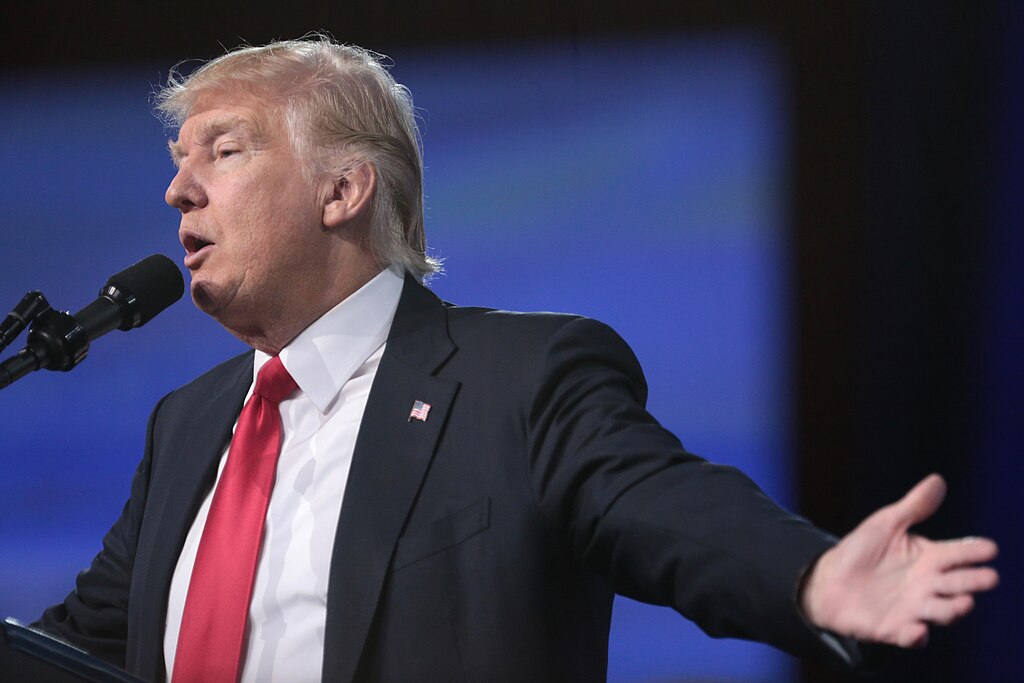After casting his ballot in Florida, former President Donald Trump addressed questions surrounding his stance on the election’s fairness and his willingness to accept the results should he lose to Vice President Kamala Harris. Trump assured reporters that he would accept the outcome, as long as the election is conducted fairly—a declaration that has drawn both support and skepticism from voters and political analysts alike.
“If I lose an election, if it’s a fair election, I’d be the first one to acknowledge it,” Trump stated confidently. His remarks reflect a noticeable shift from the contentious 2020 election, where his refusal to concede led to prolonged debates and legal challenges. “So far, I think it’s been fair,” he added, offering cautious approval of the current voting process.
Trump’s comments on the potential for post-election violence have also sparked interest. When asked if he would urge his supporters to maintain peace should he lose, Trump dismissed concerns, asserting that he didn’t need to instruct his base on peaceful behavior. “I don’t have to tell them,” he remarked, adding that his supporters “are not violent people.” This comment, intended to downplay any possibility of unrest, has drawn varied reactions, with some critics accusing Trump of downplaying the potential for tension and others applauding his faith in his supporters.
Political analysts view Trump’s statements as part of a broader effort to project confidence in the democratic process, particularly in light of past controversies surrounding his stance on election results. “Trump’s remarks appear aimed at reassuring both his base and a broader audience that he respects the electoral process,” said Dr. Nathan Cross, a political science professor. “By emphasizing fairness, he’s acknowledging the system, but also subtly placing responsibility on election officials to ensure it remains so.”
The former president’s comments quickly became a talking point across social media, with supporters celebrating his statement as a signal of accountability and critics questioning its sincerity. “Good to hear he’ll concede if it’s fair—that’s all we ask,” tweeted one supporter, while a detractor commented, “This sounds like setting up excuses if he loses.”
Trump’s faith in the peaceful nature of his supporters has also fueled debate, with some interpreting it as a veiled message. “Not saying anything is still saying something,” argued one political analyst, noting that Trump’s comments could be taken as either reassuring or dismissive of potential post-election tension.
The remarks highlight a high-stakes election where both candidates are under intense scrutiny. Trump’s pledge to accept the results if fair is notable, given the contentious nature of recent elections and accusations of voter fraud that have lingered in political discourse. Analysts note that this concessionary stance could help reduce public anxiety over the transition of power, while others remain skeptical of the former president’s intentions.
As voters across the nation head to the polls, Trump’s statements add a new layer of complexity to a charged election season. His assurance of respect for the results, pending fairness, will likely be put to the test in the days to come.



 Russia Signals Openness to U.S. Security Guarantees for Ukraine at Geneva Peace Talks
Russia Signals Openness to U.S. Security Guarantees for Ukraine at Geneva Peace Talks  Australia Rules Out Military Involvement in Iran Conflict as Middle East Tensions Escalate
Australia Rules Out Military Involvement in Iran Conflict as Middle East Tensions Escalate  Iran Supreme Leader Ayatollah Ali Khamenei Killed in Israeli, U.S. Strikes: Reuters
Iran Supreme Leader Ayatollah Ali Khamenei Killed in Israeli, U.S. Strikes: Reuters  Trump Says U.S. Attacks on Iran Will Continue, Warns of More American Casualties
Trump Says U.S. Attacks on Iran Will Continue, Warns of More American Casualties  U.S. Deploys Tomahawks, B-2 Bombers, F-35 Jets and AI Tools in Operation Epic Fury Against Iran
U.S. Deploys Tomahawks, B-2 Bombers, F-35 Jets and AI Tools in Operation Epic Fury Against Iran  Middle East Conflict Escalates After Khamenei’s Death as U.S., Israel and Iran Exchange Strikes
Middle East Conflict Escalates After Khamenei’s Death as U.S., Israel and Iran Exchange Strikes  Israel Launches Fresh Strikes on Iran After Death of Supreme Leader Ayatollah Khamenei
Israel Launches Fresh Strikes on Iran After Death of Supreme Leader Ayatollah Khamenei  Suspected Drone Strike Hits RAF Akrotiri Base in Cyprus, Causing Limited Damage
Suspected Drone Strike Hits RAF Akrotiri Base in Cyprus, Causing Limited Damage  Argentina Tax Reform 2026: President Javier Milei Pushes Lower Taxes and Structural Changes
Argentina Tax Reform 2026: President Javier Milei Pushes Lower Taxes and Structural Changes  Trump Announces U.S. Strikes on Iran Navy as Conflict Escalates
Trump Announces U.S. Strikes on Iran Navy as Conflict Escalates  Trump Warns Iran as Gulf Conflict Disrupts Oil Markets and Global Trade
Trump Warns Iran as Gulf Conflict Disrupts Oil Markets and Global Trade  UK Accepts U.S. Request to Use British Bases for Defensive Strikes on Iranian Missiles
UK Accepts U.S. Request to Use British Bases for Defensive Strikes on Iranian Missiles  Israel Strikes Hezbollah Targets in Lebanon After Missile and Drone Attacks
Israel Strikes Hezbollah Targets in Lebanon After Missile and Drone Attacks  Trump Launches Operation Epic Fury: U.S. Strikes on Iran Mark High-Risk Shift in Middle East
Trump Launches Operation Epic Fury: U.S. Strikes on Iran Mark High-Risk Shift in Middle East  U.S. Lawmakers Question Trump’s Iran Strategy After Joint U.S.-Israeli Strikes
U.S. Lawmakers Question Trump’s Iran Strategy After Joint U.S.-Israeli Strikes  Zelenskiy Urges Change in Iran After U.S. and Israeli Strikes, Cites Drone Support for Russia
Zelenskiy Urges Change in Iran After U.S. and Israeli Strikes, Cites Drone Support for Russia  Trump Says U.S. Combat Operations in Iran Will Continue Until Objectives Are Met
Trump Says U.S. Combat Operations in Iran Will Continue Until Objectives Are Met 































